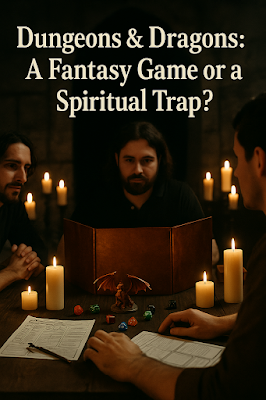Gary Gygax and the Pagan Roots of D&D: What Christians Must Know
Who Was Gary Gygax and What Did He Believe?
Gary Gygax was raised in a Christian home and reportedly attended a Jehovah’s Witness Kingdom Hall in his early years, though his faith commitment later in life is debated. He never promoted Christianity in his works, nor did he create D&D to glorify the God of the Bible. Instead, he constructed entire pantheons of fantasy gods, many of whom mirrored ancient pagan deities.
Gygax drew heavily from polytheistic and occult sources—drawing inspiration from Norse mythology, ancient Egypt, Sumerian gods, and fictional works by H.P. Lovecraft and others. These sources are laced with spiritual darkness, demonic imagery, and philosophies that contradict the Gospel.
Though Gygax claimed later in life to be a Christian (non-denominational), the content he authored promotes magic, sorcery, necromancy, and occult exploration, all condemned in Scripture (Deuteronomy 18:10-12). His private faith did not translate into any restraint in his creative output, which became deeply rooted in mysticism and paganism.
What About Dave Arneson?
Dave Arneson, the co-creator of D&D, was also raised in a Christian environment. He later converted to born-again Christianity and became critical of how dark and occultic the D&D franchise became, especially after Gygax lost creative control in the 1980s. Arneson distanced himself from the franchise’s evolution, though by then, the core foundation had already been laid.
The Pantheon of Gods in Dungeons & Dragons
One of the most disturbing elements of D&D is the inclusion of detailed pantheons of gods, many of whom are based on real-world pagan religions. Players are often encouraged to choose a god or goddess for their character to worship or gain magical powers from—an idea that directly violates the First Commandment: “You shall have no other gods before me.” (Exodus 20:3)
These fictional deities often resemble demonic entities:
-
Lolth, the spider queen, a chaotic evil goddess of deceit.
-
Vecna, a powerful undead sorcerer and god of secrets.
-
Tiamat, a dragon goddess inspired by Babylonian mythology.
Even worse, some D&D materials have included real magical rituals and sigils, adapted or taken directly from occult texts, which former occultists have confirmed align with genuine witchcraft practices.
How Dungeons & Dragons Influences the Mind and Spirit
D&D may seem like just a game, but it is more than pretend. It requires players to assume a character, make moral decisions in that character's name, and sometimes engage in role-playing that includes spell casting, necromancy, or communication with spirits. When players take on roles of wizards, warlocks, or sorcerers and repeatedly simulate dark spiritual practices, they can become spiritually desensitized or even demonically influenced.
This practice of imagination mixed with spiritual darkness is a form of gateway exposure, which can:
-
Open the mind to demonic influence.
-
Normalize the occult and sorcery.
-
Confuse moral boundaries.
-
Pull hearts away from Christ toward fantasy-based spirituality.
Scripture is clear: “Abstain from all appearance of evil.” (1 Thessalonians 5:22) and “Have nothing to do with the fruitless deeds of darkness, but rather expose them.” (Ephesians 5:11)
Why This Is Dangerous for Christians
The danger isn’t just the content—it’s the gateway effect. D&D has led many into deeper exploration of the occult, spiritualism, and moral relativism. Some players admit to starting with fantasy spell books and ending up practicing real witchcraft. Others report experiencing nightmares, spiritual oppression, or anxiety linked to their gameplay.
Christian parents and youth should take this seriously. While it may seem like innocent fantasy, D&D creates a fantasy world where evil is playable, glorified, and rewarded. That world is often more appealing than the real one—and dangerously addictive.
Conclusion: Discerning the Spirit Behind the Game
The Apostle Paul warns in 1 Corinthians 10:20, “The sacrifices of pagans are offered to demons, not to God, and I do not want you to be participants with demons.”
Dungeons & Dragons, by its design and origin, introduces players to a realm where false gods, sorcery, and demonic symbolism are normalized. Gary Gygax’s legacy may be cultural innovation, but for Christians, it represents a spiritual counterfeit that can pull hearts and minds away from the Lord.



%20(1).jpg)